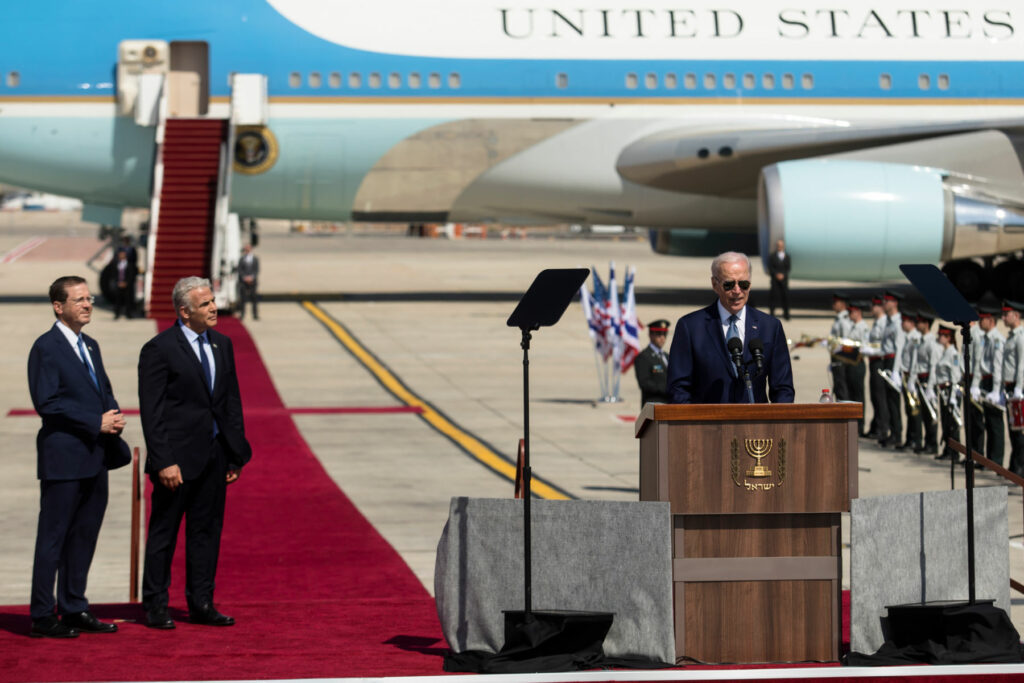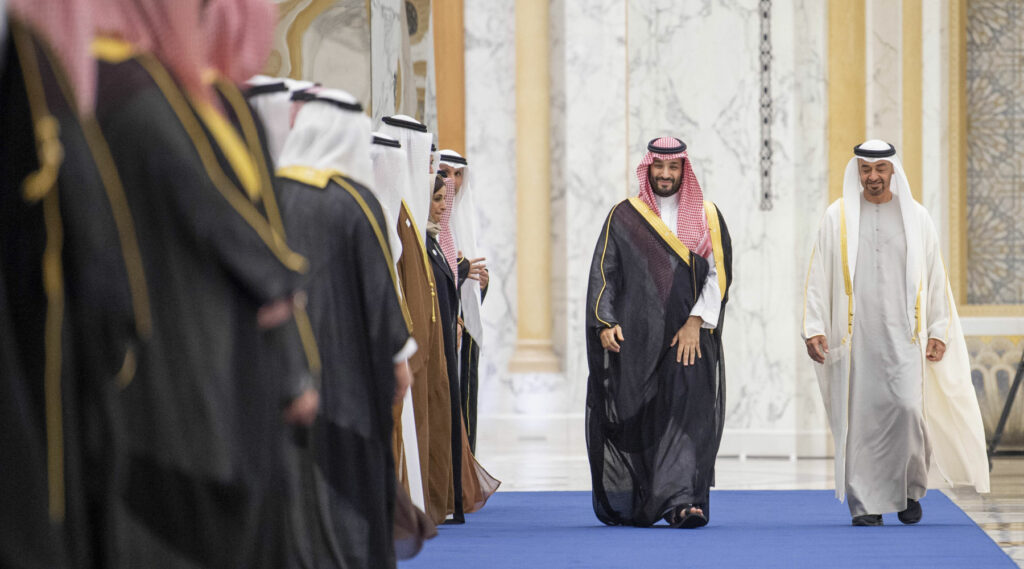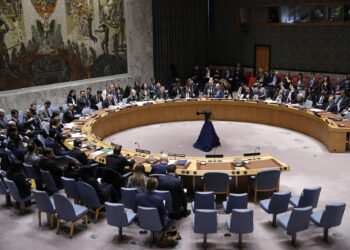Frederick Deknatel is the Executive Editor of Democracy in Exile, the DAWN journal.
The "pariah" could end up posing for a photo-op with the president, the clearest sign yet of how Joe Biden has abandoned his campaign promise to make Saudi Crown Prince Mohammed bin Salman "pay the price" for the murder of journalist Jamal Khashoggi. As U.S. president, Biden has steadily walked those words back, claiming instead to want to "recalibrate" and "reorient" America's relationship with Saudi Arabia.
Biden's trip to the kingdom this week, where he will meet with MBS himself in Jeddah, comes after energy prices have soared following Russia's invasion of Ukraine. With the Saudi government so far refusing the White House's requests to increase oil output, Biden's reversal has been justified by some as a triumph of realpolitik—an acknowledgement that the United States couldn't isolate an ally like Saudi Arabia if it came at the cost of fundamental American interests (to say nothing of Biden's domestic calculations ahead of this fall's midterm elections).
But which U.S interests are really being served by Biden going to Saudi Arabia? He has sought to frame his first visit to the Middle East as president, which began Wednesday in Israel and also includes a brief stopover in the occupied West Bank, around regional stability and cooperation, rather than simply gas prices and oil supplies. Yet Biden and his administration have been mostly silent on reports of deepening U.S. security commitments to both Saudi Arabia and the United Arab Emirates, including the possibility of a formal defense agreement with the UAE. Under the banner of Arab normalization with Israel, carrying on the Abraham Accords negotiated in the final months of Donald Trump's presidency, the Biden administration is also reportedly backing a broader security pact between Israel and Arab states to counter Iran. Biden appears set to finally unveil more details of this new defense partnership during his visit to Saudi Arabia.
To take stock of Biden's trip and what is at stake, Democracy in Exile reached out to a wide range of experts and analysts, including DAWN's own non-resident fellows, with the following question: How does Biden's visit to Saudi Arabia, and deepening U.S. security commitments to the kingdom, serve or undermine U.S. interests?
In this troubled partnership, the United States has always been excessively deferential to Saudi sensitivities; that consideration has never been reciprocated. The result is a bizarre imbalance that has now been worsened by President Joe Biden's policy incoherence.
- Thanassis Cambanis
A Long-Running Tragicomedy in the Region
President Joe Biden's visit to Saudi Arabia, after stops in Israel and Palestine, will cap a convoluted legacy of the last half-century of American foreign policies in the Middle East that are, largely, neither foreign nor policies. Genuine American interests in the region are difficult to pin down, because weak Arab leaderships have always allowed America's Middle East actions to be driven by the more precise interests of Israel, American arms manufacturers, and assorted domestic and foreign lobby groups. Washington also often acts in reactionary opposition to some new power it does not like (Soviets, Iran, Arab radicals, Islamists)—rather than to promote healthy, mutually beneficial ties with leaders who credibly represent their people.
Biden openly stated a few weeks ago that his Saudi visit mainly aims to assist Israel, and knowledgeable analysts also see Washington eager to create a mythical U.S.-Arab-Israeli regional coalition against Iran. This is all fanciful nonsense from confused American officials who have tried unsuccessfully to do this several times before (Henry Kissinger, Alexander Haig, George Shultz, James Baker)—while decade after decade, U.S. foes like Russia, China, Iran, Islamists and others keep expanding their presence, firepower and influence in the region.
The U.S. always followed up its failed regional alliances by having to repeatedly intervene militarily across much of the Middle East. This lesson is clear: In an Arab- and Muslim-majority region, such an American "foreign policy" is an elusive mirage if it is mainly shaped by Israel, U.S. lobbyists and arms merchants, Christian fundamentalists, erratic and profit-oriented energy policies, hasty pushbacks against new regional powers, and Arab leaders who mostly do not represent their people's best interests. As this tragicomedy on a global scale keeps replaying over and over again, it now consumes confused American presidents as it continues to devastate and bankrupt entire Arab societies.
—Rami G. Khouri is an author, political analyst and communications trainer who teaches at the American University of Beirut.
*
The Costs of Biden's U-Turn
Biden's visit to Saudi Arabia may strengthen American security alliances with regional powers to counter Iran, but only in the short term. Biden's objective of strengthening strategic partnerships while "holding true to American values," fundamental freedoms and human rights is an impossible feat that is tantamount to supporting both impunity and accountability at the same time. This is true for the war crimes committed in the Saudi-led war in Yemen and the torture and disappearances of political dissidents across the Middle East. It is also true for the U.S. government's complicity in the perpetration of such crimes.
In an unsurprising U-turn, Biden went from a campaign promise of disengagement and isolation of Saudi Crown Prince Mohammed bin Salman, to a presidential policy of direct engagement with Saudi leaders. His visit to Saudi Arabia and his engagement with several of the region's autocrats send an ominous and all too familiar message to their victims: Your lives don't matter when we can achieve security gains at your expense. But continued disregard for human rights threatens U.S., regional and global security. Biden's visit will only serve to fuel anger and resentment on the streets that these dictators brutally oppress, which can hardly be touted as a win for "regional security," nor for U.S. interests.
—Noha Aboueldahab is an assistant professor at Georgetown University in Qatar where she teaches courses on international law and transitional justice. She is also a non-resident fellow in the Foreign Policy program at The Brookings Institution in Washington and a senior non-resident fellow at the Middle East Council on Global Affairs.
*
New Priorities Imposed by Russia's War in Ukraine
President Biden's visit to the kingdom and outreach to Saudi Crown Prince Mohammed bin Salman are indicative of new U.S. priorities imposed by the Russian invasion of Ukraine. The Biden administration must focus on energy security, to ease gas prices in the United States, but also to support our European allies. The challenge is both geostrategic and political: to counter Russian territorial expansion and defiance of state sovereignty, and to ease the energy and inflationary crisis, which is emboldening populist forces on the European continent, as well as at home.
Saudi Arabia is key. As the primary oil exporter holding spare capacity, Saudi Arabia could lessen the energy crunch, albeit marginally, and could further pressure Russia financially and politically by ending its cooperation in oil markets through the OPEC + agreement.
One could argue that the preservation of the trans-Atlantic democratic alliance is foundational to a liberal order underpinning human rights. Yet there is no denying that the rehabilitation of Mohammed bin Salman comes at a cost, or at least, a recognition that full accountability for the heinous murder of Jamal Khashoggi will not be achieved. The Biden administration has justified the trip as a peace visit, advancing the truce in Yemen and Israeli-Arab normalization. More germane to the cause of rights in Saudi Arabia would be to press for an end to the travel ban on prominent Saudi detainees. Leveraging litigation against the crown prince in the United States might be key to such negotiations.
—Kristin Smith Diwan is a senior resident scholar at the Arab Gulf States Institute in Washington.

Biden's Worst Course of All
Until the United States redefines its concept of stability, its commitments to authoritarian bargains in the Middle East will continue to undermine America's own interests while also eroding the well-being of the people who live in the region. The U.S. relationship with Saudi Arabia is emblematic of the danger of short-term, transactional relationships. No doubt Saudi Arabia is an important country, deploying market-moving sums of cash through sovereign investments, and in control of the most important oil supply in the world, because of the unparalleled ease with which Saudi Arabia can shift its production levels. No doubt as well, Saudi Arabia relies on enormous amounts of U.S. weaponry and, more critically, the U.S. defense umbrella.
In this troubled partnership, the United States has always been excessively deferential to Saudi sensitivities; that consideration has never been reciprocated. The result is a bizarre imbalance that has now been worsened by President Joe Biden's policy incoherence. Biden the candidate wanted to "center" human rights in foreign policy and impose some consequence for the murder of Jamal Khashoggi. But Biden the president also wants to keep Saudi Arabia from tilting too far in the direction of China and Russia, and he wants Saudi support on oil prices, and on much more. In the long term, the only way to strengthen U.S. interests in the region is to promote the rule of law and good governance, which requires suffering serious short-term disruptions in energy markets, weapons contracts and regional security arrangements. The next best option would be to openly acknowledge what tradeoffs Washington is willing to make in pursuit of short-term transactional bargains. The worst course of all is the one selected by Biden: to pursue every single U.S. policy aim at the same time, guaranteeing that in the Middle East, it will achieve none.
—Thanassis Cambanis is an author, journalist and the director of Century International. His work focuses on U.S. foreign policy, Arab politics and social movements in the Middle East.
*
A Necessary, If Not Noble, Course Correction
Presidential visits to key foreign countries are often not as consequential as the buildup of expectations before the travel. It is extremely rare that a single presidential visit fundamentally transforms an important interstate relationship. But these trips can serve a forcing function for the national security bureaucracy, to clarify or resolve ongoing issues in dispute, to highlight the underlying basis for cooperation and, if possible, to make new commitments in areas of shared interest. The visit to Saudi Arabia will likely have aspects of these normal dynamics of presidential visits, but it is burdened with the extra, and awkward, reality of an exceptionally contentious relationship between the U.S. president and the Saudi crown prince and de facto leader of the kingdom. Biden had taken an absolutist stand on U.S. relations with the kingdom in the aftermath of the Khashoggi assassination, and he and Mohammed bin Salman have exchanged insults.
As for U.S. interests, Saudi Arabia has never fit neatly into the paradigm of allies with shared values, and America's interests and ideals can be in conflict with the kingdom's. Energy and Gulf security are the ties that bind, and even on the energy front, the logic of mutual interdependence has shifted quite a bit in recent years. Biden's efforts to make human rights a key pillar of U.S. foreign policy will bend to these more conventional security requirements—a familiar pattern over the decades of the U.S.-Saudi relationship. In Biden's words, it's time to "reorient," not "rupture," the relationship—a necessary, if not noble, course correction.
—Ellen Laipson is the director of the International Security Program at the Schar School of Policy and Government at George Mason University.
*
Biden Should Shame and Demand, Not Grovel and Beg
There has been a long, unbroken line of support for Saudi Arabia in successive American presidencies—surprising because the kingdom is a totalitarian state. At first, it was for the oil. Now it's mainly about Iran, another attempt to encircle Iran and starve the Islamic Republic to death. Going to the kingdom to beg for cooperation is not a good look for Biden, not least because it underscores the U.S. complicity in the Yemen catastrophe, as well as in massive Saudi human rights violations, including the murder of Jamal Khashoggi.
Saudi Arabia's refusal to increase oil production after Russia's invasion of Ukraine underscores again its amorality in global politics. People in the developing world suffer life-or-death consequences when oil prices rise so precipitously. Biden should not be entangled in this. He should use leverage—arms sales and weapons use—to get the Saudis to pump more oil. Shame and demand, not grovel and beg.
—John Tirman is the executive director of the MIT Center for International Studies, coauthor of Republics of Myth: National Narratives and the US-Iran Conflict, and a non-resident fellow at DAWN.
His visit to Saudi Arabia and his engagement with several of the region's autocrats send an ominous and all too familiar message to their victims: Your lives don't matter when we can achieve security gains at your expense.
- Noha Aboueldahab
Back to the Failed Fixation on Iran
President Biden's trip to Saudi Arabia and the idea of deepening security commitments contradict his promise as a candidate to make Saudi Arabia a "pariah," in the wake of the Saudi-led war in Yemen and the murder of Jamal Khashoggi. Failing to hold Saudi accountable for clear violations of international law is inconsistent with the administration's stated goal of upholding and leading the so-called international rules-based order. The double standards with which rules are applied to U.S. allies and adversaries undermine the entire purpose of such an order. In terms of political brinkmanship, Biden is showing weakness in allowing Saudi Arabia to pressure his administration into submission using its control over oil as leverage. Instead, Biden could have delivered on two campaign promises at once, by returning to the Iran nuclear deal, lifting sanctions and easing the burden of high oil prices by allowing Iranian oil in the global market.
Thus, Biden's strategy represents a reversion to the failed U.S. approach of organizing the region around conflict with Iran, which ensures a permanent U.S. military presence to serve the interests of "partners" in the region, and maintains forever wars and impunity for U.S. allies. All while undermining U.S. and global security interests that would benefit from reduced tensions.
—Assal Rad, is the research director of the National Iranian American Council (NIAC).
*
Currying Favor With Client States
The close relationship with Saudi Arabia has been harming U.S. interests for many years, and Biden's desire to strengthen that relationship and increase security commitments to the kingdom and other regional clients takes U.S. foreign policy in the Middle East in the wrong direction. The president's visit to Jeddah is part of his administration's efforts to curry favor with Saudi Arabia and the United Arab Emirates, and that has meant continued weapons supplies and increased military deployments to these states that do not advance U.S. security interests in the slightest. The new security guarantees for Saudi Arabia and the UAE that the administration has reportedly been discussing would further entangle the United States in the region's conflicts to the detriment of all concerned.
A closer security relationship with Saudi Arabia would be an outrage considering the myriad war crimes their forces have committed in Yemen with U.S.-made weapons. It would also set the U.S. up to enable more Saudi aggression in the future. Deepening the U.S.-Saudi relationship following the wrecking and starving of Yemen would be an unconscionable blunder, and it would further implicate the United States in the kingdom's many crimes against its own people and its neighbors.
—Daniel Larison is a contributing editor at Antiwar.com and former senior editor at The American Conservative magazine.
*
A Serious Blow to U.S. Values
In my view, President Biden's visit to Saudi Arabia is a serious blow to U.S. values and principles of democracy and human rights, especially as they pertain to Saudi Arabia's role in the barbaric murder of Jamal Khashoggi—particularly under the authority and on orders of Crown Prince Mohammed bin Salman. In addition, MBS has authorized the detention without charge, sexual assaults and torture of women's rights activists.
From a foreign policy perspective, given the crises with the Iran nuclear negotiations and Russia's involvement in the Middle East, Biden's need to reconcile with Saudi Arabia might be understandable. Specifically, Russia's invasion of Ukraine has precipitated severe energy and food insecurity regionally and globally. Also, the Biden administration needs to "refresh" relations with Saudi Arabia due to the latter's infatuation with former President Donald Trump.
That being said, it is absolutely imperative for the United States to exert legal, political and other kinds of pressure on Saudi Arabia and even on international legal organizations to bring the perpetrators of the Khashoggi murder to justice and send an unequivocal message to MBS that his actions do not translate into impunity for him and his country. If everyone sweeps the murder of Khashoggi and the brutality afflicted on human rights activists under the rug, then MBS emerges as yet another violently repressive strongman who believes that he is untouchable. The world already has far too many of those.
—Hayat Alvi is an associate professor at the U.S. Naval War College. The views expressed here are her own.

How to Restore a Mutually Beneficial Relationship
President Biden's visit to Saudi Arabia is colored by Russian President Vladimir Putin's use of oil as economic blackmail, as well as his theft of Ukrainian grain to bolster Russia's sagging foreign reserves—actions which have increased insecurity across the globe.
The kingdom of Saudi Arabia is a world power in energy supply, a regional power in security issues and a driver of Sunni religio-communal programs even in nations where Muslims are a minority. Biden's visit must address Saudi Arabia's role in the oil market to bring down energy costs globally. Biden should work with the kingdom's de facto ruler, Crown Prince Mohammed bin Salman, to help quell political turmoil and re-establish civil society within the Middle East, particularly in Yemen where only an amicable solution can end the proxy war between Saudi Arabia and Iran. Pushing for overall de-escalation of tensions between those Persian Gulf rivals could further the moderation of Iran's nuclear program, too. Despite progress toward de-fundamentalization within the kingdom, Saudi public and private resources continue to spread a militant da'wa, or Islamic mission, abroad. Biden should be clear that stoking religious tensions elsewhere is unacceptable both as policy and conviction.
Successfully convincing Saudi Arabia and its leadership down these paths would benefit U.S. national interests, enhance the kingdom's international stature and restore a mutually beneficial relationship between Washington and Riyadh.
—Carol E. B. Choksy is Senior Lecturer of Strategic Intelligence in the Luddy School of Informatics, Computing and Engineering at Indiana University.
—Jamsheed K. Choksy is Distinguished Professor of Central Eurasian and Iranian Studies in the Hamilton Lugar School of Global and International Studies at Indiana University and was a member of the United States National Council on the Humanities from 2008 to 2019.
*
Poor Strategy and More Unfulfilled Promises
President Biden's visit to Saudi Arabia undermines U.S. interests by further diminishing U.S. standing, discarding American values and floating a potential security arrangement that is likely to mire the United States in Middle East conflict in perpetuity.
The most obvious harm from this visit is the damage done to Biden's credibility and his efforts to reposition the United States as a champion of democracy, human rights and the rule of law. Despite the president's protestations to the contrary, it is not possible to insist that saving the world from autocracy is the struggle of our time and then to shower praise and support on autocrats that recklessly wage war and systematically repress their own citizens. This visit only further exposes this hypocrisy and jeopardizes the president's democracy agenda.
Indeed, Biden has gone out of his way to praise Saudi Arabia's "leadership" for the truce in Yemen, while ignoring that the unchecked ambition and military adventurism of Crown Prince Mohammed bin Salman catapulted this conflict from an intrastate civil war into a complex and sprawling armed conflict and the worst humanitarian crisis in the world. Biden also glosses over the fact that the Saudis and their military coalition in Yemen had already lost this war and are looking for a way out due to strategic necessity, not because they are moved by U.S. diplomacy.
In contrast, the American public has little appetite for revisiting the failed U.S. policies that Biden's trip and his visit to Saudi Arabia promise. It is telling that a recent poll shows less than one in four Americans support this trip. But even from a coldly pragmatic assessment, without any consideration of American values, a deepened U.S. security commitment to Saudi Arabia is poor strategy more likely to result in greater U.S. military involvement in the region, not less.
When justifying his trip in his recent Washington Post op-ed—itself another indicator of how unpopular this trip is—Biden noted with pride that he will be the first U.S. president since 9/11 to visit the Middle East without U.S. troops engaged in a combat mission. Although a questionable assertion, ending U.S. combat missions in the region is important. But this hardly means that U.S. troops do not remain deployed throughout the region or that America's deadly drone wars—with their requisite civilian casualties—do not continue without interruption.
Real change that would truly serve U.S. interests means pivoting away from fossil fuel tyrants toward renewable energy—to date, another unfulfilled promise from the president—and refusing to underwrite the security bill for future Middle East conflict.
—John Hursh is the program director at DAWN and a visiting scholar at the Center for Human Rights and Humanitarian Studies at Brown University.
*
What Kind of 'Strategic Partner' Is This?
Writing in The Washington Post, President Biden sought to justify his trip to Saudi Arabia in the following terms. "My aim," he wrote, is "to reorient—but not rupture—relations with a country that's been a strategic partner for 80 years."
This is a stunning statement to make. It begs the question: Has the House of Saud been our strategic partner for the past 80 years? Has our support for this family dictatorship enhanced international peace and security and U.S. interests? Place me in the skeptical camp, along with 3,000 American families who lost loved ones on 9/11.
Recall, most of the terrorists who attacked the U.S. that day were Saudi citizens. This suggests that internal Saudi repression has negative consequences for the West. But what about MBS' new "Vision 2030" modernization program? John Travolta and Justin Bieber have visited the kingdom, women now can drive and cinemas have opened. Will this not breath fresh air into a stifled society and diminish the threat of radicalization?
The answer is no. Top-down, forced modernization policies will inevitably produce a blowback, especially in deeply conservative societies. Gradual, organically connected, bottom-up socio-political change can mitigate this possibility. Sadly, this is not an option in Saudi Arabia today under the iron fist control of MBS. We reap what we sow.
—Nader Hashemi is the director of the Center for Middle East Studies and an associate professor of Middle East and Islamic politics at the Josef Korbel School of International Studies at the University of Denver. He is also a non-resident fellow at DAWN.
*
Rewarding Autocrats With Nothing in Return
Deepening U.S. security commitments to Saudi Arabia—or any state in the Middle East for that matter—is strategically nonsensical. News of Biden's plans to deepen our commitment to the region comes at a critical juncture for the United States: We are continuing to deepen our involvement in Eastern Europe with no end in sight to the war in Ukraine; tensions continue to rise between China and Taiwan, which risks dragging the United States into the foray; and we are still deeply fractured internally, hindering our ability to adequately respond to pressing domestic or foreign matters (let alone save our democracy). Such security guarantees from Washington would cement our commitment to the underlying source of instability in the Middle East, the authoritarian status quo, while yielding virtually nothing for America in return.
These authoritarians present a false reality to Washington and the West more generally, depicting themselves as the only viable upholders of "stability" and "order" in the Middle East, despite the fact that their own policies produce and reinforce many of the region's underlying problems, tensions and grievances. American support is what allows these governments to act with impunity at home and abroad. Increased overtures from Biden would embolden Riyadh and other regional autocrats, paving the way for further regional instability and increased pressure on Washington from other autocratic actors for greater U.S. commitments to the Middle East.
—Jon Hoffman is a PhD candidate at George Mason University specializing in Middle East geopolitics and political Islam.
*
Biden's Trump-Like Policy
President Biden takes his first Middle East trip, to Israel and Saudi Arabia, in the wake of Israeli forces killing prominent Palestinian-American journalist Shireen Abu Akleh, and just before the fourth anniversary of Saudi agents killing Washington Post columnist Jamal Khashoggi.
When he was running for president against Donald Trump, candidate Biden famously said that he would turn Saudi Arabia into a "pariah" and vowed to punish the monarchy for the brutal assassination of Khashoggi. But just over a year into his presidency, Biden has changed course and is traveling to the oil-rich kingdom to visit the Saudi monarchs as "partners." Candidate Biden had also promised to bring the U.S. back into the nuclear deal with Iran that Trump had withdrawn from, but a deal has not been reached and crippling economic sanctions against Iran have continued. Despite past criticisms of the Trump administration's Abraham Accords to normalize relations between Israel and several Arab countries, the Biden administration has also celebrated and expanded that agreement, further sidelining Palestinians.
Biden's first trip to the region as president is a demonstration of his administration's Middle East policy over the past year. Despite the change of rhetoric, the Biden administration's policy toward the region has not been much different than the Trump administration's. While campaign slogans and rhetoric were centered on peace and diplomacy, and human rights and democracy, the real politics and actions of this administration continue to look more like those of the previous occupant in the White House.
—Negar Mortazavi is an Iranian-American journalist and political analyst based in Washington D.C. She is the host and editor of the Iran Podcast.






































